Ensemble
Donate
Newsletter
Follow US
2007-06-03: After Bartók: What's Next?
After Bartók: What's Next?
Sunday, June 3, 2007 at 7pm
Nordstrom Recital Hall, Benaroya Hall
Part of the Seattle Symphony
CENTRAL EUROPE MUSIC FESTIVAL:
BRIDGING THE 48TH PARALLEL
View bio

PROGRAM
ÁDÁM KONDOR Quartet to Christian Wolff for flute, clarinet, violin and cello
PETER EÖTVÖS Two Poems to Polly solo for a speaking cello player
AGATA ZUBEL Cascando for soprano, flute, clarinet, violin and cello Commissioned by the SCP (world premiere)
GYÖRGY KURTÁG Hommage à R. Sch. for clarinet, viola and piano
JAN KAPR Cvičeni pro Gydli ("Exercises for Gydli") for soprano, flute and harp
STEVAN KOVACS TICKMAYER Brettl Trio for clarinet, violin and piano (world premiere)
Take a glimpse into music’s future in this program filled with experiment, reminiscence, jazz and collage. Exceptional living voices from Central Europe converge with the impetuous soprano of young composer Agata Zubel.
Please join us for a pre-concert presentation one hour prior to the performance with the Radost Folk Ensemble and Dunava women's choir performing ethnic dances and songs of Eastern Europe, and a Post-Concert Inside-Out with Agata Zubel and the SCP musicians following the concert.
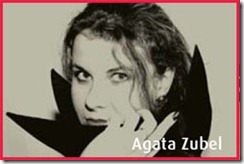
Agata Zubel
Soprano and Composer
Composer's Activities: Her works have been regularly performed at numerous festivals, including Warsaw Autumn, Musica Polonica Nova, the Andrzej Panufnik Days of Music in Kraków, the Poznań Musical Spring, Chanterelle Festival, Ultraschall in Berlin, and festivals in Russia and Switzerland. In most of these events she also participated as a singer. Her Symphony No. 2 commissioned by Deutsche Welle was premiered during Beethoven Festival in Bonn (2005). In summer 2004, she participated in the International Courses of Composition in Darmstadt.
Performing Experience: Has participated in many prestigious musical events in Poland, Italy, Russia, Belgium, Switzerland, Germany, Ireland, the Netherlands and Greece. Has premiered and recorded numerous works of contemporary composers. Her operatic performances include the title roles in Zygmunt Krauze's The Star with the Wrocław Opera and in Dobromiła Jaskot's Phédre with the National Opera in Warsaw.
Awards and Prices: Music Prize of Wroc?aw City (2005); Special Prize from International Gaudeamus Interpreters Competition in Amsterdam (2005); Second Prize at the International Jurgenson Competition of Young Composers in Moscow, Russia (2003); Third Price at the International Competition in the Interpretation of Contemporary Music in Switzerland (2003); Principal Prize at the 20th- and 21st-Century Music Competition for Young Performers (2003); First Prize at Krzysztof Penderecki International Contemporary Music Competition (2002); First Prize at Andrzej Panufnik Composition Competition (1999).
Scholarships: From Ernst von Siemens Musikstiftung, the Poland Minister of Culture, the Management of Wrocław City and the International Foundation of Education.
Background: Graduated from The Karol Lipinski University of Music in Wrocław, Poland; currently teaches at the same university. She also studied at Conservatorium Hogeschool e Enschede in the Netherlands.
PROGRAM NOTES
by Dr. Elena Dubinets
After Bartók: What's Next?
PETER EÖTVÖS - Two poems to Polly for a speaking cello player
Born: January 2, 1944, in Székelyudvarhely (now Odorheiv Secviesc), Transylvania
Work composed: 1998
The Hungarian composer, conductor and teacher Peter Eötvös enjoys a multifaceted and important career. He graduated from the Budapest Academy of Music in composition and the Hochschule für Musik in Cologne in conducting. He has composed a number of works including four operas (and is now working on two more), many orchestral and chamber works, electronic compositions and music for film and theater. Eötvös is considered to be one of the best-known interpreters of 20th century music. He has appeared with the Berlin, Netherlands Radio and Munich Philharmonics, Orchestre Philharmonique de Radio France, Ensemble InterContemporain, the BBC Symphony; London Sinfonietta, Royal Concertgebouw Orchestra and Orchestre de la Suisse Romande. He is Principal Guest Conductor at Gothenburg Symphony Orchestra. His recording of Bartók's Bluebeard´s Castle with SWR Stuttgart Radio Symphony Orchestra was nominated for a Grammy Award in 2004. In 1991 he founded the International Eötvös Institute and Foundation in Budapest for young conductors and composers and he has also been teaching at the Hochschule für Musik in Karlsruhe.
Two poems to Polly is a spoken song performed by the cellist, who is speaking and playing at the same time. The composer used the poems written a thousand years ago by a Japanese woman known as Lady Sarashina, who was a poet at the imperial court (Eötvös is currently working on an opera about her). The poems are interpreted as a dialogue between a man, who is waiting for his deceased lover to come back from the other word, and the voice that answers from there.
JAN KAPR - Cvičeni pro Gydli ("Exercises for Gydli") for soprano, flute and harp
Born: March 3, 1914, in Prague
Died: April 29, 1988, in Prague
Work composed: 1967
Jan Kapr graduated from the Prague Conservatory and for seven years was engaged as a music producer of Radio Prague. From 1961-72 he was a lecturer in composition at the Janáček Academy of Music and Dramatic Arts. Jan Kapr has written several theoretical essays and a book as well as many works for different instrumentation and movies. His extensively tonal idiom changed substantially during the sixties, when the composer became interested in modern compositional techniques, new methods of playing instruments and sonic possibilities, including electronic sounds. His richly idiomatic musical language is full of deeply-felt expressivity and emotional urgency.
In his Exercises for Gydli, Jan Kapr used a special word invented by his little daughter; the word "Gydli" became in the end her nickname. Only the second Exercise is written to a "normal" text of a children's rhyme. In the last two Exercises the author tried to extract new sounds out of the remarks of the child, both in whining and playful "prattling" moods.
The SCP is grateful to Ms. Magdalena Vyoralova, the composer's daughter (the little "Gydli"), for providing the music.
ÁDÁM KONDOR - Quartet to Christian Wolff for flute, clarinet, violin and cello
Born: February 19, 1964, in Budapest, Hungary
Work composed: 2001, revised in 2006
Adam Kondor studied composition at the Bartók Conservatory (where he later taught music theory) and then at the Liszt Academy of Music in Budapest. He was greatly influenced by his compatriot composers György Kurtág (with whom he studied) and recently Peter Eötvös. Kondor received the Art Prize of the Soros Foundation in 1999. He was composer in residence in Edenkoben, Germany (1991) and at the first Ostrava New Music Days (2001). His music has been performed in many European countries and in the United States.
The Quartet on tonight's program was heavily influenced by Christian Wolff's early compositional technique. Wolff (b. 1934) was one of the most radical composers-innovators of the second half of the past century, along with his friends and co-members of the New York School - John Cage, Morton Feldman and Earle Brown - and particularly strived for performers' "parliamentary participation" and freedom during the performance. However his early music used a limited number of repetitive patterns and pitches, creating a static beauty of strikingly individual sounds - the exact feature which impressed Kondor. The Quartet begins with three expansive solos employing principles of Hungarian folk songs, later joined together accompanied by cello pizzicato. The composer says:
"An immediate inspiration for my quartet was Christian Wolff's Serenade for flute, clarinet and violin (1950). I added the cello to Wolff's instruments, but it plays only pizzicato (in a quasi-continuo style) in the second movement of the piece, just marking the end by changing to bowing. Wolff shows unbelievable mastery in creating meaningful tensions and differences in a drastically reduced number of pitches (uses no more than three pitches, one of them also transposed an octave higher). All the structurally relevant rules and ideas of my piece stem from his composition and through a series of metonymic transformations they were applied to my greatly heterogeneous material. Indeed, my preoccupation at the time of the composition was amalgamating such locally and temporarily distant musical practices as Hungarian folk-songs, medieval counterpoint, musical rhetoric of C.P.E. Bach, heterophony of traditional Thai music and quotations from works of the 20th century composers by means of a coherent set of logical principles into a language-like musical flow."
GYÖRGY KURTÁG - Hommage à R. Sch.
Born: February 19, 1926, in Lugos (Lugoj) in Romania
Work composed: 1990
György Kurtág is Hungary's foremost non-émigré living composer. He was born in a Hungarian family in Romania, but moved to Budapest at 20 and graduated from the Franz Liszt Academy of Music as a pianist and composer. In 1957-58 he spent a year in Paris, attending classes of Messiaen and Milhaud as well as of art psychologist Marianne Stein. He was also profoundly influenced by the scores of Anton Webern. After his return to Budapest and until 1993 Kurtág worked at the Academy of Music and then, when the borders between Eastern and Western Europe became more transparent, began extensively working outside the country - as composer-in-residence with the Berlin Philharmonic and the Vienna Konzerthaus, in the Netherlands, in Paris and elsewhere. In 2006 Kurtág won the Grawemeyer Award for Music Composition.
Kurtág's stylistic inclination comes from a chamber music approach to composing, with its immediacy and concentration of expression. His Hommage à R. Sch. reflects upon the composer's affection for Robert Schumann's music, especially his cycles of miniature works (including Märchenerzählungen ("Fairy Tale Stories") whose instrumentation the piece resembles). The titles of the movements also refer to Schumannesque poetic names as well as to the Romantic composer's music characters. Kapellmeister Johannes Kreisler of the swiftly whirlpooling first movement is a character created by E.T.A. Hoffmann that became the namesake of Schumann's Kreisleriana cycle. The names of Eusebius from the second movement and Florestan from the third movement refer to pseudonyms that Schumann used in his journal to allude to different sides of his own personality, the first being more rational and introverted and the second more flamboyant and outgoing. The "Eusebius" movement is a short canon based on a song from Kurtág's own Kafka-Fragmente; the "Florestan" movement transforms the anguish coming from the character's "trembling lips" into the spasmodic convulsions.
The short but moody fourth movement, titled in Hungarian, is based on a line from the poem Dal ("Song") by Attila József, and leads to the fifth movement, the flickering "In the Night," the name and the texture of which is reminiscent of a similarly titled piece from Schumann's Phantasiestücke ("Fantasy Pieces"). The final, most voluminous, movement introduces yet another of Schumann's artist-characters, Meister Raro, who was conceived as a counterpoising voice between Eusebius and Florestan. Here, Raro mediates between the preceding controversies through the Medieval composer Guillaume de Machaut's spirit, building the processional music up to a magnificent climax and then down to the dark but soft bass drum beat produced by the clarinet player.
STEVAN KOVACS TICKMAYER - Brettl Trio (world premiere)
Born: April 7, 1963, in Novi Sad (Vojvodina in former Yugoslavia)
Work composed: 2005
Composer, improviser and essayist, Stevan Kovacs Tickmayer was born in the Hungarian national minority community of the former Yugoslavia. He studied composition in the Academy of Arts in Novi Sad, with Louis Andriessen at the Royal Conservatory in The Hague and with Marta and György Kurtàg. In 1986 Tickmayer formed his Tickmayer Formatio ensemble consisting of classically trained musicians as well as new jazz and rock improvisers. Since 1991 he has lived in France.
Tickmayer has been a composer in residence with many groups and festivals, including ART/OMI, New York (1999) and Gidon Kremer's Lockenhaus Kammermusikfest (2003). Kremer also performed a piece of Tickmayer at his recital in Seattle this season. Tickmayer has also collaborated with Martha Argerich, Kremerata Baltica, Keller Quartet, Netherlands Blazers Ensemble, De Volharding, David Geringas and many others.
The composer introduces his Brettl Trio:
"The story of this trio rolls back to the beginning of the eighties, when, still a student of composition, I started my up-to-date-lasting project (a work in progress) entitled as "Intellectual Cabaret," consisting of approximately thirty rather short pieces. The very idea behind this project was a reaction to the omnipresent New Music dogma based on the Adornian "progressive" thoughts that, at the conservatory where I studied, were taught as the only possible truth. The other idea was a re-valorization of the other "sin," materialized in the so-called B-scored music and usually underestimated by the academic circles. But this fusion did not suggest any banal solutions or simplifications. Far from that, the piece you are about to hear puts very high demands on the performers. It was, and still is, just yet another vision of today's music where elements of both traditions - the classic and the lighter ones - meet each other in a kind of surrealistic cook book and forge together a possible image of the music of our time. Some movement titles in this work are borrowed from the chapters or fragments of books which influenced me heavily in my student years, that's how Witold Gombrowicz (Childish Filibert), James Joyce (…and there was a moo-cow…), Franz Kafka (Hunger Artist) and St. Augustine found each other in the same neighborhood.
AGATA ZUBEL - Cascando (world premiere)
Born: January 25, 1978, in Wrocław, Poland
Work composed: 2007
Agata Zubel is not only an exceptionally gifted soprano (see her bio on the guest artists bio page), but also one of the most radical, sometimes wild and always thought-provoking composers of her generation.
Her new piece Cascando, created especially for the Seattle Chamber Players, is based on a text of Samuel Beckett reflected in the music from many angles: as a poem, structure, words, sounds, letters, ambience, and impression. Having written the piece for her own phenomenal voice, Zubel instructs the soprano to produce unusual sounds covering a huge range, with all possible nuances of vocalizing, Sprechgesang, whispering and other sound expressions. With all these experiments, which are also happening in the instrumental parts, the murky air of this music is filled with the Romantic sensitivity typical of Polish music since the times of Chopin. The piece begins as a soprano and violin duo in shimmering pianissimo that develops through different sonic effects in the ensemble texture. A very short and jerky staccato of the second movement, alternating with abrupt rests, becomes the foundation for the brief words spread out through the entire soprano range. In the climax, the instruments repeatedly descend with a non-synchronous glissandi held against the floating bass suspended in the cello part, intercepted with the tragic exclamations about "all the others that will love you." The last movement does not employ exact pitches; it uses noise effects produced on all instruments and a phrase whispered twice against the backdrop of mystical percussive sounds: "…unless they love you…"
Sunday, June 3, 2007 at 7pm
Nordstrom Recital Hall, Benaroya Hall
Part of the Seattle Symphony
CENTRAL EUROPE MUSIC FESTIVAL:
BRIDGING THE 48TH PARALLEL
View bio
PROGRAM
ÁDÁM KONDOR Quartet to Christian Wolff for flute, clarinet, violin and cello
PETER EÖTVÖS Two Poems to Polly solo for a speaking cello player
AGATA ZUBEL Cascando for soprano, flute, clarinet, violin and cello Commissioned by the SCP (world premiere)
GYÖRGY KURTÁG Hommage à R. Sch. for clarinet, viola and piano
JAN KAPR Cvičeni pro Gydli ("Exercises for Gydli") for soprano, flute and harp
STEVAN KOVACS TICKMAYER Brettl Trio for clarinet, violin and piano (world premiere)
Take a glimpse into music’s future in this program filled with experiment, reminiscence, jazz and collage. Exceptional living voices from Central Europe converge with the impetuous soprano of young composer Agata Zubel.
Please join us for a pre-concert presentation one hour prior to the performance with the Radost Folk Ensemble and Dunava women's choir performing ethnic dances and songs of Eastern Europe, and a Post-Concert Inside-Out with Agata Zubel and the SCP musicians following the concert.

Agata Zubel
Soprano and Composer
Composer's Activities: Her works have been regularly performed at numerous festivals, including Warsaw Autumn, Musica Polonica Nova, the Andrzej Panufnik Days of Music in Kraków, the Poznań Musical Spring, Chanterelle Festival, Ultraschall in Berlin, and festivals in Russia and Switzerland. In most of these events she also participated as a singer. Her Symphony No. 2 commissioned by Deutsche Welle was premiered during Beethoven Festival in Bonn (2005). In summer 2004, she participated in the International Courses of Composition in Darmstadt.
Performing Experience: Has participated in many prestigious musical events in Poland, Italy, Russia, Belgium, Switzerland, Germany, Ireland, the Netherlands and Greece. Has premiered and recorded numerous works of contemporary composers. Her operatic performances include the title roles in Zygmunt Krauze's The Star with the Wrocław Opera and in Dobromiła Jaskot's Phédre with the National Opera in Warsaw.
Awards and Prices: Music Prize of Wroc?aw City (2005); Special Prize from International Gaudeamus Interpreters Competition in Amsterdam (2005); Second Prize at the International Jurgenson Competition of Young Composers in Moscow, Russia (2003); Third Price at the International Competition in the Interpretation of Contemporary Music in Switzerland (2003); Principal Prize at the 20th- and 21st-Century Music Competition for Young Performers (2003); First Prize at Krzysztof Penderecki International Contemporary Music Competition (2002); First Prize at Andrzej Panufnik Composition Competition (1999).
Scholarships: From Ernst von Siemens Musikstiftung, the Poland Minister of Culture, the Management of Wrocław City and the International Foundation of Education.
Background: Graduated from The Karol Lipinski University of Music in Wrocław, Poland; currently teaches at the same university. She also studied at Conservatorium Hogeschool e Enschede in the Netherlands.
Program Notes
PROGRAM NOTES
by Dr. Elena Dubinets
After Bartók: What's Next?
PETER EÖTVÖS - Two poems to Polly for a speaking cello player
Born: January 2, 1944, in Székelyudvarhely (now Odorheiv Secviesc), Transylvania
Work composed: 1998
The Hungarian composer, conductor and teacher Peter Eötvös enjoys a multifaceted and important career. He graduated from the Budapest Academy of Music in composition and the Hochschule für Musik in Cologne in conducting. He has composed a number of works including four operas (and is now working on two more), many orchestral and chamber works, electronic compositions and music for film and theater. Eötvös is considered to be one of the best-known interpreters of 20th century music. He has appeared with the Berlin, Netherlands Radio and Munich Philharmonics, Orchestre Philharmonique de Radio France, Ensemble InterContemporain, the BBC Symphony; London Sinfonietta, Royal Concertgebouw Orchestra and Orchestre de la Suisse Romande. He is Principal Guest Conductor at Gothenburg Symphony Orchestra. His recording of Bartók's Bluebeard´s Castle with SWR Stuttgart Radio Symphony Orchestra was nominated for a Grammy Award in 2004. In 1991 he founded the International Eötvös Institute and Foundation in Budapest for young conductors and composers and he has also been teaching at the Hochschule für Musik in Karlsruhe.
Two poems to Polly is a spoken song performed by the cellist, who is speaking and playing at the same time. The composer used the poems written a thousand years ago by a Japanese woman known as Lady Sarashina, who was a poet at the imperial court (Eötvös is currently working on an opera about her). The poems are interpreted as a dialogue between a man, who is waiting for his deceased lover to come back from the other word, and the voice that answers from there.
JAN KAPR - Cvičeni pro Gydli ("Exercises for Gydli") for soprano, flute and harp
Born: March 3, 1914, in Prague
Died: April 29, 1988, in Prague
Work composed: 1967
Jan Kapr graduated from the Prague Conservatory and for seven years was engaged as a music producer of Radio Prague. From 1961-72 he was a lecturer in composition at the Janáček Academy of Music and Dramatic Arts. Jan Kapr has written several theoretical essays and a book as well as many works for different instrumentation and movies. His extensively tonal idiom changed substantially during the sixties, when the composer became interested in modern compositional techniques, new methods of playing instruments and sonic possibilities, including electronic sounds. His richly idiomatic musical language is full of deeply-felt expressivity and emotional urgency.
In his Exercises for Gydli, Jan Kapr used a special word invented by his little daughter; the word "Gydli" became in the end her nickname. Only the second Exercise is written to a "normal" text of a children's rhyme. In the last two Exercises the author tried to extract new sounds out of the remarks of the child, both in whining and playful "prattling" moods.
The SCP is grateful to Ms. Magdalena Vyoralova, the composer's daughter (the little "Gydli"), for providing the music.
ÁDÁM KONDOR - Quartet to Christian Wolff for flute, clarinet, violin and cello
Born: February 19, 1964, in Budapest, Hungary
Work composed: 2001, revised in 2006
Adam Kondor studied composition at the Bartók Conservatory (where he later taught music theory) and then at the Liszt Academy of Music in Budapest. He was greatly influenced by his compatriot composers György Kurtág (with whom he studied) and recently Peter Eötvös. Kondor received the Art Prize of the Soros Foundation in 1999. He was composer in residence in Edenkoben, Germany (1991) and at the first Ostrava New Music Days (2001). His music has been performed in many European countries and in the United States.
The Quartet on tonight's program was heavily influenced by Christian Wolff's early compositional technique. Wolff (b. 1934) was one of the most radical composers-innovators of the second half of the past century, along with his friends and co-members of the New York School - John Cage, Morton Feldman and Earle Brown - and particularly strived for performers' "parliamentary participation" and freedom during the performance. However his early music used a limited number of repetitive patterns and pitches, creating a static beauty of strikingly individual sounds - the exact feature which impressed Kondor. The Quartet begins with three expansive solos employing principles of Hungarian folk songs, later joined together accompanied by cello pizzicato. The composer says:
"An immediate inspiration for my quartet was Christian Wolff's Serenade for flute, clarinet and violin (1950). I added the cello to Wolff's instruments, but it plays only pizzicato (in a quasi-continuo style) in the second movement of the piece, just marking the end by changing to bowing. Wolff shows unbelievable mastery in creating meaningful tensions and differences in a drastically reduced number of pitches (uses no more than three pitches, one of them also transposed an octave higher). All the structurally relevant rules and ideas of my piece stem from his composition and through a series of metonymic transformations they were applied to my greatly heterogeneous material. Indeed, my preoccupation at the time of the composition was amalgamating such locally and temporarily distant musical practices as Hungarian folk-songs, medieval counterpoint, musical rhetoric of C.P.E. Bach, heterophony of traditional Thai music and quotations from works of the 20th century composers by means of a coherent set of logical principles into a language-like musical flow."
GYÖRGY KURTÁG - Hommage à R. Sch.
Born: February 19, 1926, in Lugos (Lugoj) in Romania
Work composed: 1990
György Kurtág is Hungary's foremost non-émigré living composer. He was born in a Hungarian family in Romania, but moved to Budapest at 20 and graduated from the Franz Liszt Academy of Music as a pianist and composer. In 1957-58 he spent a year in Paris, attending classes of Messiaen and Milhaud as well as of art psychologist Marianne Stein. He was also profoundly influenced by the scores of Anton Webern. After his return to Budapest and until 1993 Kurtág worked at the Academy of Music and then, when the borders between Eastern and Western Europe became more transparent, began extensively working outside the country - as composer-in-residence with the Berlin Philharmonic and the Vienna Konzerthaus, in the Netherlands, in Paris and elsewhere. In 2006 Kurtág won the Grawemeyer Award for Music Composition.
Kurtág's stylistic inclination comes from a chamber music approach to composing, with its immediacy and concentration of expression. His Hommage à R. Sch. reflects upon the composer's affection for Robert Schumann's music, especially his cycles of miniature works (including Märchenerzählungen ("Fairy Tale Stories") whose instrumentation the piece resembles). The titles of the movements also refer to Schumannesque poetic names as well as to the Romantic composer's music characters. Kapellmeister Johannes Kreisler of the swiftly whirlpooling first movement is a character created by E.T.A. Hoffmann that became the namesake of Schumann's Kreisleriana cycle. The names of Eusebius from the second movement and Florestan from the third movement refer to pseudonyms that Schumann used in his journal to allude to different sides of his own personality, the first being more rational and introverted and the second more flamboyant and outgoing. The "Eusebius" movement is a short canon based on a song from Kurtág's own Kafka-Fragmente; the "Florestan" movement transforms the anguish coming from the character's "trembling lips" into the spasmodic convulsions.
The short but moody fourth movement, titled in Hungarian, is based on a line from the poem Dal ("Song") by Attila József, and leads to the fifth movement, the flickering "In the Night," the name and the texture of which is reminiscent of a similarly titled piece from Schumann's Phantasiestücke ("Fantasy Pieces"). The final, most voluminous, movement introduces yet another of Schumann's artist-characters, Meister Raro, who was conceived as a counterpoising voice between Eusebius and Florestan. Here, Raro mediates between the preceding controversies through the Medieval composer Guillaume de Machaut's spirit, building the processional music up to a magnificent climax and then down to the dark but soft bass drum beat produced by the clarinet player.
STEVAN KOVACS TICKMAYER - Brettl Trio (world premiere)
Born: April 7, 1963, in Novi Sad (Vojvodina in former Yugoslavia)
Work composed: 2005
Composer, improviser and essayist, Stevan Kovacs Tickmayer was born in the Hungarian national minority community of the former Yugoslavia. He studied composition in the Academy of Arts in Novi Sad, with Louis Andriessen at the Royal Conservatory in The Hague and with Marta and György Kurtàg. In 1986 Tickmayer formed his Tickmayer Formatio ensemble consisting of classically trained musicians as well as new jazz and rock improvisers. Since 1991 he has lived in France.
Tickmayer has been a composer in residence with many groups and festivals, including ART/OMI, New York (1999) and Gidon Kremer's Lockenhaus Kammermusikfest (2003). Kremer also performed a piece of Tickmayer at his recital in Seattle this season. Tickmayer has also collaborated with Martha Argerich, Kremerata Baltica, Keller Quartet, Netherlands Blazers Ensemble, De Volharding, David Geringas and many others.
The composer introduces his Brettl Trio:
"The story of this trio rolls back to the beginning of the eighties, when, still a student of composition, I started my up-to-date-lasting project (a work in progress) entitled as "Intellectual Cabaret," consisting of approximately thirty rather short pieces. The very idea behind this project was a reaction to the omnipresent New Music dogma based on the Adornian "progressive" thoughts that, at the conservatory where I studied, were taught as the only possible truth. The other idea was a re-valorization of the other "sin," materialized in the so-called B-scored music and usually underestimated by the academic circles. But this fusion did not suggest any banal solutions or simplifications. Far from that, the piece you are about to hear puts very high demands on the performers. It was, and still is, just yet another vision of today's music where elements of both traditions - the classic and the lighter ones - meet each other in a kind of surrealistic cook book and forge together a possible image of the music of our time. Some movement titles in this work are borrowed from the chapters or fragments of books which influenced me heavily in my student years, that's how Witold Gombrowicz (Childish Filibert), James Joyce (…and there was a moo-cow…), Franz Kafka (Hunger Artist) and St. Augustine found each other in the same neighborhood.
AGATA ZUBEL - Cascando (world premiere)
Born: January 25, 1978, in Wrocław, Poland
Work composed: 2007
Agata Zubel is not only an exceptionally gifted soprano (see her bio on the guest artists bio page), but also one of the most radical, sometimes wild and always thought-provoking composers of her generation.
Her new piece Cascando, created especially for the Seattle Chamber Players, is based on a text of Samuel Beckett reflected in the music from many angles: as a poem, structure, words, sounds, letters, ambience, and impression. Having written the piece for her own phenomenal voice, Zubel instructs the soprano to produce unusual sounds covering a huge range, with all possible nuances of vocalizing, Sprechgesang, whispering and other sound expressions. With all these experiments, which are also happening in the instrumental parts, the murky air of this music is filled with the Romantic sensitivity typical of Polish music since the times of Chopin. The piece begins as a soprano and violin duo in shimmering pianissimo that develops through different sonic effects in the ensemble texture. A very short and jerky staccato of the second movement, alternating with abrupt rests, becomes the foundation for the brief words spread out through the entire soprano range. In the climax, the instruments repeatedly descend with a non-synchronous glissandi held against the floating bass suspended in the cello part, intercepted with the tragic exclamations about "all the others that will love you." The last movement does not employ exact pitches; it uses noise effects produced on all instruments and a phrase whispered twice against the backdrop of mystical percussive sounds: "…unless they love you…"
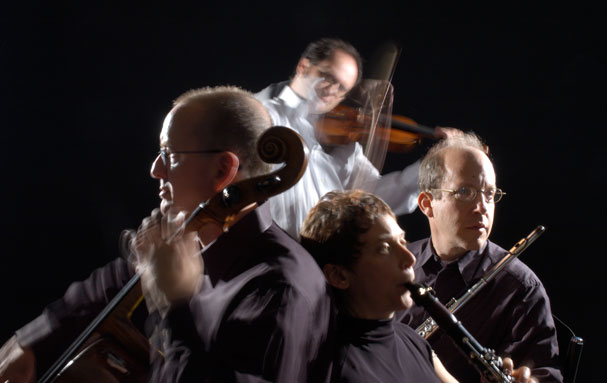
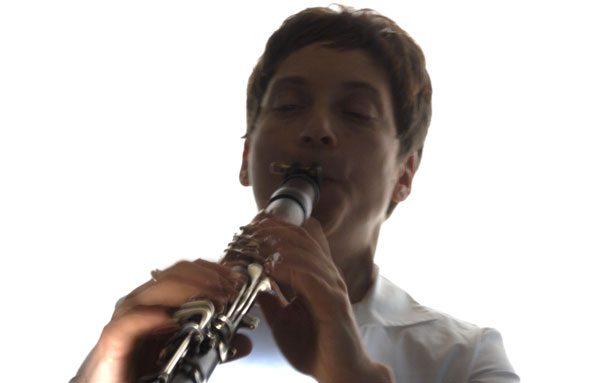
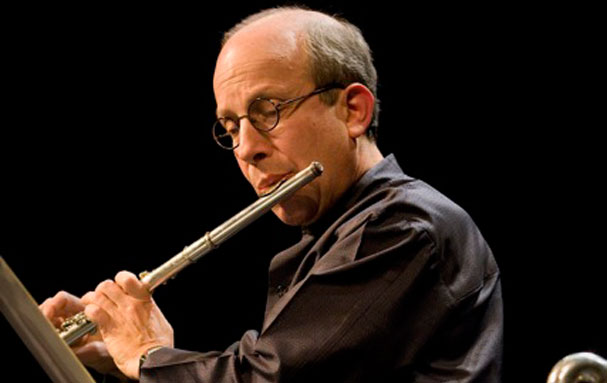
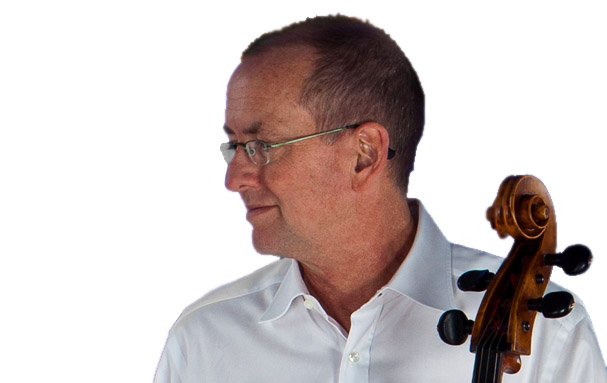
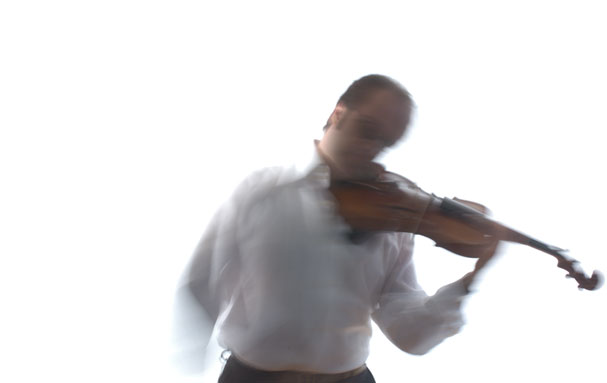
 Laura DeLuca
Laura DeLuca Mikhail Shmidt
Mikhail Shmidt David Sabee
David Sabee Paul Taub
Paul Taub